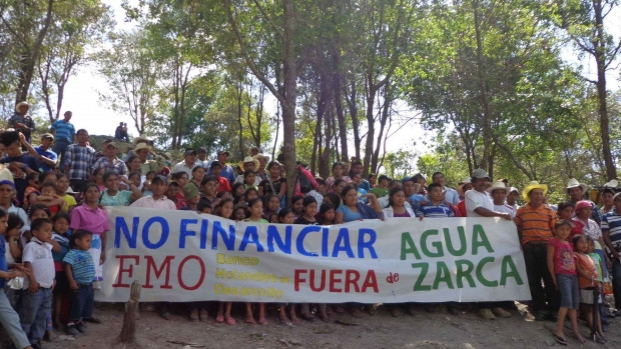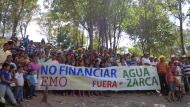Civil society welcomes FMO decision to not provide loan to Honduran bank FICOHSA

The success
The Dutch development bank FMO did not provide a US$60 million loan to Banco Financiero Comercial Hondureño S.A. (FICOHSA) – a Honduran commercial bank that is linked to numerous human rights controversies.
BankTrack's role
BankTrack’s role: BankTrack, together with partners in Honduras and the Netherlands, sent multiple letters and held direct meetings with FMO calling on them to not provide the loan due to issues around corruption and violence that the money would likely support. Previously to this, BankTrack had been involved in the campaign to stop the Agua Zarca Dam project in Honduras that was operated by Desa, a company which FICOHSA has provided finance to. In 2018, Honduran courts ruled that Desa executives had ordered the execution of Berta Cáceres, the co-founder of COPINH and leader of the opposition against the Agua Zarca project. FMO funded the dam project, although it later withdrew its finance. BankTrack and partners urged FMO to learn from its previous mistakes by stopping the loan to FICOHSA.
BankTrack and other NGOs welcome the Dutch development bank FMO’s decision to rule out a US$60 million loan to Banco Financiero Comercial Hondureño S.A. (FICOHSA), the Honduran commercial bank linked to numerous human rights controversies. However, questions remain regarding why and how FMO came to this decision and FMO continues to have financial ties to FICOHSA, including a 6% equity interest in the bank.
On Monday 17 May, BankTrack joined the Council of Popular and Indigenous Organizations of Honduras (COPINH) as well as fellow Dutch civil society organisations Oxfam Novib, Both ENDS and SOMO, in sending a letter to FMO calling on the bank once again to not provide a new loan to FICOHSA bank.
A previous letter to the bank led by Honduran civil society, from July 2020, noted: “Far from contributing to the development that the people of Honduras need, by providing a loan to FICOHSA the FMO would instead be providing support to the network of politically influential businesses involved in corruption scandals and violence that form part of FICOHSA’s investment portfolio.”
Controversial companies financed by FICOHSA include the Dinant Corporation – a palm oil company operating on the Caribbean coast in Honduras which has employed private security forces implicated in acts of extreme violence, including killings. Additionally, a study into corruption in Honduras describes the relationship between FICOHSA and the Honduran Institute of Social Security (IHSS) corruption scandal in which the bank reportedly participated in an illegal transfer of IHSS funds.
Significantly, evidence from the Berta Cáceres assassination trial revealed that FICOHSA provided funding to shareholders in the company behind the Agua Zarca dam, Desa, and that these funds were used in the development and building of the project. Berta Cáceres, the co-founder of COPINH, was assassinated in 2016 for her role in resisting the Agua Zarca dam; in 2018 Honduran courts ruled that the execution was ordered by Desa executives. FMO funded the dam project, although it later withdrew its finance.
The civil society organisations have called on FMO to hold consultation meetings with local stakeholders in Honduras, but to date requests from Honduras organisations for a meeting have not been granted.
Hannah Greep, Human Rights Campaigner at BankTrack: “FMO has made the right decision in not providing the loan to FICOHSA bank. However, the Dutch development bank’s lack of willingness to engage with stakeholders from Indigenous and community groups in Honduras calls into question the adequacy of its human rights due diligence and its decision-making processes. FMO should have learned more from its past mistakes in Honduras and needs to start listening to those on the ground.”
See also COPINH's statement on the news here.

